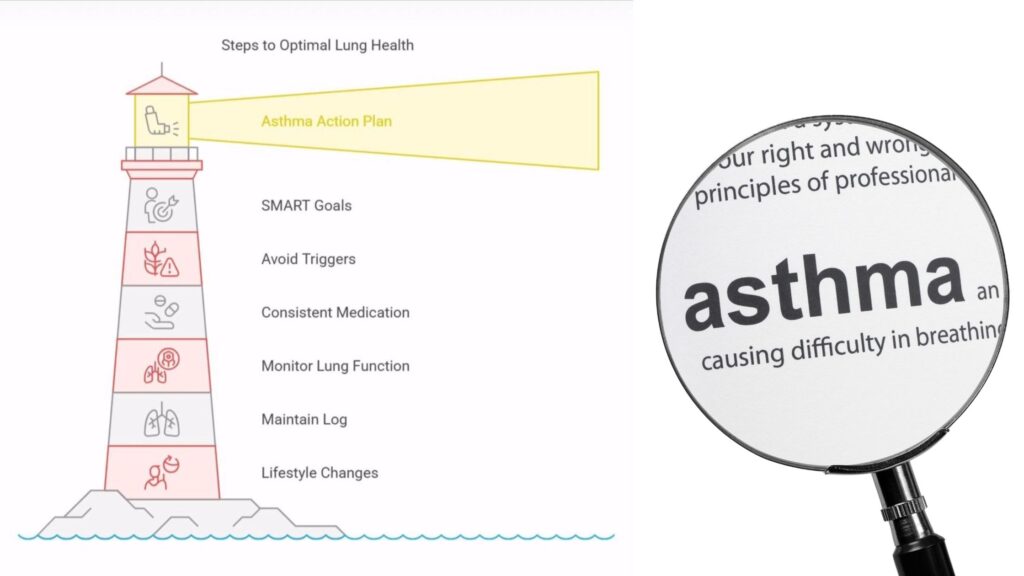
Asthma is a chronic respiratory condition that affects millions of people worldwide. If not managed properly, it can interfere with daily life, limit physical activities, and lead to severe health complications. However, by setting clear asthma goals and following a structured approach, you can effectively control your symptoms and reduce associated risks.
What Should Be Your Asthma Goals?
1. Symptom Control
The primary goal of asthma management is to control symptoms and improve overall quality of life. Effective symptom control includes:
- Experiencing fewer asthma symptoms during the day and night.
- Maintaining the ability to perform daily activities, including exercise and recreational activities, without restrictions.
- Using a reliever inhaler less frequently.
- Avoiding emergency room visits due to asthma attacks.
2. Reducing Risks
Another key goal is to minimize potential asthma-related risks, including:
- Preventing asthma exacerbations that could lead to severe attacks.
- Reducing the risk of side effects from long-term asthma medication use.
- Minimizing exposure to asthma triggers such as allergens, pollutants, and infections.
3. Optimal Lung Function and Productivity
Maintaining good lung function is essential for a healthy and active life. Your goals should include:
- Keeping your lungs functioning at an optimal level.
- Avoiding work or school absences due to asthma flare-ups.
- Ensuring you can breathe easily and comfortably throughout the day.
How to Achieve These Asthma Goals?
Achieving these asthma goals requires a combination of medical management, lifestyle modifications, and proactive monitoring. Below are essential steps to help you stay in control of your asthma:
1. Follow an Asthma Action Plan
An asthma action plan is a personalized strategy created with your doctor to help you manage symptoms and respond to flare-ups. It typically includes:
- Daily medication schedules.
- A list of symptoms and their severity.
- Emergency action steps for worsening symptoms.
2. Set SMART Goals for Asthma Management
SMART goals are:
- Specific: Define clear and precise objectives, such as reducing the use of a rescue inhaler.
- Measurable: Track symptoms and medication usage regularly.
- Achievable: Set realistic expectations based on your condition.
- Relevant: Focus on goals that directly impact your health and well-being.
- Time-bound: Establish deadlines to evaluate progress and make necessary adjustments.
3. Avoid Exposure to Allergens and Triggers
Asthma symptoms are often triggered by allergens or environmental irritants. Reduce your exposure by:
- Keeping indoor spaces free from dust, mold, and pet dander.
- Avoiding smoke, strong perfumes, and chemical fumes.
- Monitoring pollen counts and air quality before going outdoors.
4. Take Your Medications Consistently Proper medication adherence is crucial for asthma control.
This includes:
- Using prescribed inhalers (both relievers and controllers) as directed.
- Not skipping doses, even when feeling better.
- Consulting a doctor before making changes to medication.
5. Monitor Your Lung Function Regularly Routine lung function tests help track asthma progression and effectiveness of treatment.
Key tests include:
- Peak Flow Meter Readings – Measures how well air moves out of your lungs.
- Spirometry Test – Evaluates overall lung capacity and airflow obstruction.
6. Maintain a Log of Your Lung Function and Symptoms. Keeping a journal of symptoms, peak flow readings, and medication use can help identify patterns and triggers. It also assists doctors in making informed treatment adjustments.
7. Make Lifestyle Changes for Better Asthma Control
- Eat a Healthy Diet: Include anti-inflammatory foods like fruits, vegetables, and omega-3-rich sources.
- Exercise Regularly: Engage in activities that strengthen lung capacity, such as swimming and walking.
- Avoid Alcohol and Caffeine at Night: These substances can worsen asthma symptoms and disturb sleep.
- Stay Hydrated: Drinking enough water helps clear mucus and keep airways open.
What to Do If You Are Not Meeting Your Asthma Goals?
If you find it difficult to control your asthma despite following these steps, it is crucial to consult a pulmonologist immediately. Signs that indicate the need for professional intervention include:
- Increased frequency or severity of symptoms.
- Over-reliance on a rescue inhaler.
- Frequent asthma attacks requiring emergency care.
- Poor response to prescribed medications.
Conclusion
Managing asthma effectively requires a proactive approach that includes symptom control, risk reduction, and maintaining optimal lung function. By setting clear goals and following an asthma action plan, you can lead a healthier and more active life. Remember, consistency in medication use, avoiding triggers, and making lifestyle changes are key to keeping asthma under control. If you experience difficulties in achieving your asthma goals, seek medical advice promptly to adjust your treatment plan accordingly.